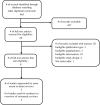Continuing education for the prevention of mild cognitive impairment and Alzheimer's-type dementia: a systematic review and overview of systematic reviews
- PMID: 31270114
- PMCID: PMC6609120
- DOI: 10.1136/bmjopen-2018-027719
Continuing education for the prevention of mild cognitive impairment and Alzheimer's-type dementia: a systematic review and overview of systematic reviews
Abstract
Objective: To summarise evidence on the preventive effects of continuing education on mild cognitive impairment and Alzheimer's-type dementia in adults 45 years or older.
Design: Systematic review and overview of systematic reviews.
Data sources: We systematically searched MEDLINE, PsycINFO, EMBASE, Cochrane Central Register of Controlled Trials, Cumulative Index to Nursing and Allied Health Literature, and Scopus for published studies and grey literature databases for unpublished studies from January 1990 to April 2018.
Methods: To assess evidence directly addressing our objectives, we conducted a systematic review. Because we were aware of a dearth of direct evidence, we also performed an overview of systematic reviews on leisure activities that mimic formal continuing education. We a priori established the inclusion and exclusion criteria. Two authors independently assessed inclusion and exclusion at the abstract and full-text level, rated the risk of bias, and determined the certainty of evidence using the Grading of Recommendations Assessment, Development and Evaluation. We resolved all discrepancies by consensus. We synthesised the available evidence narratively.
Results: Our searches identified 4933 citations. For the systematic review, only two publications on the same prospective cohort study (Tasmanian Healthy Brain Project) met the inclusion criteria; for the overview of reviews, we included five systematic reviews. Based on 459 participants, preliminary data of the ongoing cohort study indicated that cognitive reserve statistically significantly increased in persons attending university classes compared with the control group (92.5% vs 55.7%, p<0.01). Likewise, language processing capacities statistically significantly improved (p<0.01). Episodic memory, working memory and executive function did not differ significantly between groups. Systematic reviews consistently reported a positive association between participation in cognitively stimulating leisure activities and reduced incidence of dementia and improved cognitive test performance.
Conclusion: Available results demonstrate that cognitive reserve increases through continuing education and show a positive association of cognitive leisure activities with both improved cognitive function and lower dementia incidence.
Prospero registration number: CRD42017063944.
Keywords: continuing education; dementia; mild cognitive impairment; preventive medicine; systematic review.
© Author(s) (or their employer(s)) 2019. Re-use permitted under CC BY-NC. No commercial re-use. See rights and permissions. Published by BMJ.
Conflict of interest statement
Competing interests: None declared.
Figures



References
-
- World Health Organistation (WHO). Dementia: A public health priority. 2012. http://apps.who.int/iris/bitstream/10665/75263/1/9789241564458_eng.pdf?ua=1 (Accessed 20 Apr 2017).
-
- Patterson C, Lynch C, Bliss A, et al. . World Alzheimer report 2018 - the state of the art of dementia research: New frontiers. 2018. https://www.alz.co.uk/research/WorldAlzheimerReport2018.pdf (Accessed 15 Feb 2019).
-
- Alzheimer’s Association. Alzheimer’s disease facts and figures. 2018. https://www.alz.org/media/HomeOffice/Facts and Figures/facts-and-figures... (Accessed 15 Feb 2019).
-
- Association AP. Diagnostic and statistical manual of mental disorders. Fifth Edition (DSM-5): American Psychiatric Publishing, 2013.
-
- Committee on Decreasing the Risk of Alzheimer’s-Type Dementia. Mild cognitive impairment age-related cognitive IBoHS, Policy Institute of, Medicine National Academies of Sciences, Engineering Medicine. The National Academies Collection: Reports funded by National Institutes of Health. Considerations for the Design of a Systemic Review of Interventions for Preventing Clinical Alzheimer’s-Type Dementia, Mild Cognitive Impairment, and Age-Related Cognitive Decline: Letter Report. 2015. https://www.nap.edu/catalog/21885/considerations-for-the-design-of-a-sys... (Accessed 17 Apr 2017). - PubMed
Publication types
MeSH terms
LinkOut - more resources
Full Text Sources
Medical
Miscellaneous
